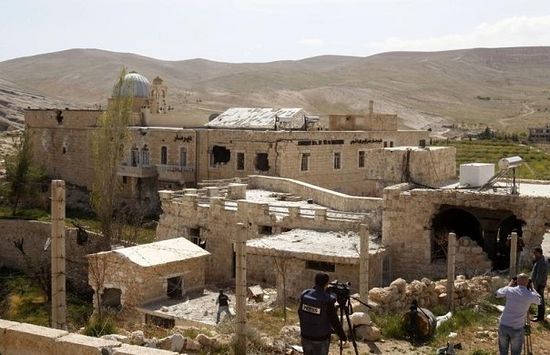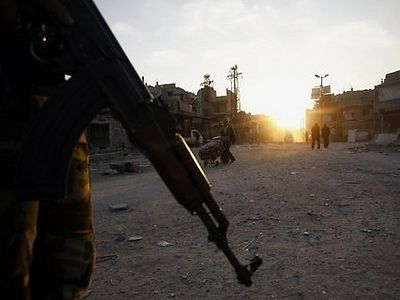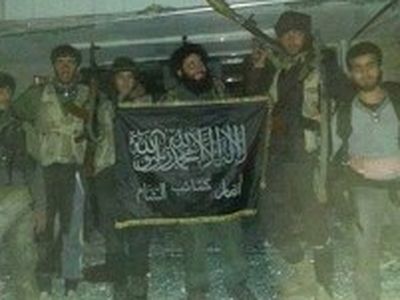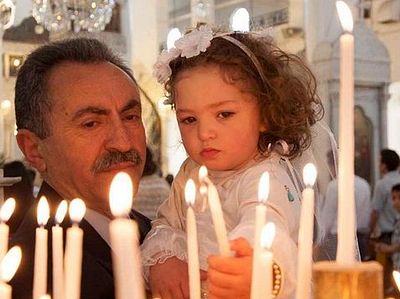Source: Thomson Reuters Foundation
 Members of the media photograph the damages in Mar Bacchus Sarkis monastery building, in Maloula village, northeast of Damascus, after soldiers loyal to Syria's President Bashar al-Assad took control of it from rebel fighters, April 14, 2014. REUTERS/khaled al-Hariri
Members of the media photograph the damages in Mar Bacchus Sarkis monastery building, in Maloula village, northeast of Damascus, after soldiers loyal to Syria's President Bashar al-Assad took control of it from rebel fighters, April 14, 2014. REUTERS/khaled al-Hariri
The sound of battles echoes from the outskirts of the capital as Christians in Damascus celebrated the Easter weekend, briefly ignoring the conflict for the yearly ritual.
At the gates of Saint George Syrian Orthodox Church - just a few minutes walk from a school where a mortar attack killed several children and injured dozens earlier this week - incense was burning as several uniformed and armed men stood patrol before Good Friday evening services. They joked with each other and did not check ID cards or handbags as people entered.
Inside the ancient city walls of the Old City where the church is located, the cobbled streets bustled with evening shoppers and diners, a rare sight reminiscent of pre-war Damascus.
However, a traditional procession that usually sees hundreds of worshippers follow an effigy of Jesus on the cross accompanied by drums and a church band was cancelled.
Christians, many belonging to ancient denominations found only in Syria, form about 10 percent of the country's population. Most fear the rising power of Islamist groups within the rebel movement fighting to overthrow President Bashar al-Assad, although many are also wary of the authorities.
Only a small percentage of Christians have taken up arms on either side of a civil war that broadly pits minorities, in particular Assad's Alawite sect, an offshoot of Shi'ite Islam, against the Sunni Muslim majority.
Two Armenian Syrian women chatted with others in the courtyard of the church. Asked if they felt optimistic about the events in Syria, they launched into a short debate.
"No, I don't feel good at all. I'm sad and I'm here to join Christ in his pain," said Rula Khoury.
Khoury's friend, Tamar Barashelian, disagreed.
"No, we can't just be sad and stay at home all the time and get depressed. I overcome my sadness and force myself to go out and continue with life," she said.
Like other Syrians, many Christians have been displaced, seen their sons killed in fighting or been forced to flee mandatory military service in Assad's army.
Many support the government, which says it is protecting the country from foreign-backed Sunni Muslim militants who will persecute non-Sunni minorities, including Christians.
The pastor's wife, among a group of women expressing pro-Assad views, said: "I can forgive any Syrian who shed Syrian blood. But I won't forgive the Arab countries that conspired to kill us."
Another woman said: "The Syrian Army is always victorious."
There are also Christians who oppose the authorities but they generally keep a low profile, especially in Damascus where government surveillance is common. Syria's exiled opposition includes a few prominent Christians, while others identify with a small grassroots movement called the Third Current which condemns violence by both sides.
Churchgoers on Good Friday were relaxed despite the occasional sound of government shelling, now so routine in Damascus that hardly anyone flinches at the sound of blasts in rebel-held districts surrounding the city.
Inside the church, the congregants prayed in Syriac, an ancient Semitic language spoken in the pre-Islamic Levant and closely related to the old Aramaic probably spoken by Jesus.
AN ENGAGEMENT
In the interior courtyard, the church scout group marching band mingled. One young couple, recently engaged, leaned on the courtyard wall and accepted congratulations.
"I was blown away when I heard. Rami and Juliette? Who knew you were an item? Congratulations my dears," one young man told the couple before he shook their hands and kissed them.
More than 150,000 people have been killed in the civil war, a third of them civilians. Millions have fled the country.
The conflict has been broadly stalemated for months, with the government generally dominant in Damascus, the main central cities and western, coastal regions of Syria, while the rebels hold wide swathes of the north and east. Hardline Islamists have become more prominent among the rebels, alienating many who once supported the call for greater democracy.
Later in the evening, the mood on the road out of the Old City returned to its usual tenseness, and additional shelling could be heard. Traffic was jammed as usual at several checkpoints, where nervous armed men vet each car for bombs.
Passengers inside an idle minivan waited their turn in silence to show ID and be searched, their faces solemn and tired, their windows rolled down in the warm breeze.
A popular folk song played on their radio. Its chorus repeated the words: "Beautiful is my country. Beautiful is my country." (The identity of the correspondent has been withheld for security reasons; Editing by Oliver Holmes and Peter Graff)



